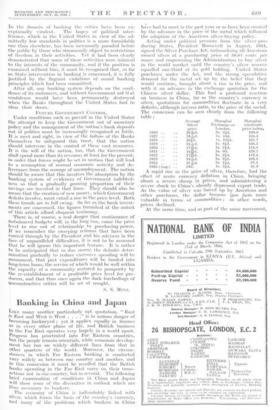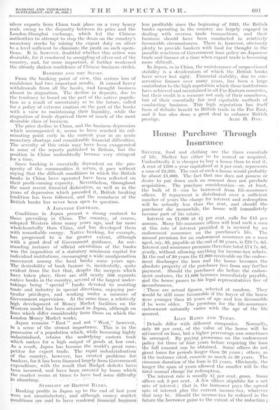Banking in China and Japan
LikE many another particularly apt quotation, " East is East and West is West . . . is in serious danger of becoming hackneyed ; yet it applies equally in finance as in every other phase of lire, and British business in the Far East operates very largely in a world apart. Progress has penetrated into Far Eastern countries, but the people remain orientials, while economic developt, ment has run on widely different lines from that in other quarters of the world. Moreover, the circum- Stances in which Far Eastern banking is conducted vary widely as between one country and another, and in this connexion it must be recalled that the British banks operating in the Far East carry on their trans- actions not in one country, but in several. The following brief examination of conditions in China and Japan Will show some of the diversities in outlook which are thus necessary to bankers. The economy of China' is indissolubly linked with silver, which forms the basis of the country's currency, and many of the problems which. bankers • in China have had to meet in the past year or so have been created by the advance in the price of the metal which followed the adoption of the American silver-buying policy. ' Acting under political pressure from the silver-prat clueing States, President Roosevelt in August, 1934, signed the Silver Purchase Act, nationalising all American owned silver at a purchasing price of 50.01 cents per ounce and empowering the Administration to buy silver in the world market until the country's silver reserve equalled one-third of its gold holding. United States purchases under the Act, and the strong speculative demand for the metal set up by the belief that they Would continue,' brought about a rise in the price, and With it an advance in the exchange quotation for the Chinese silver' dollar. This had a profound reaction on business in China; for as the country's currency is silver, quotations for commodities .fluctuate in a very definite, although inverse ratio, to the price of the metal. The connexion can. be seen clearly. from the following table :
1925 . • 1927• • 1928 . • 1929 • • 1930 • • 1931 • • 1932 • •
119"343 . .
1935 (Aug.) ..
. :
Average Spilrivceei: • 2811d. 26ad. 261d. 24/70. 17iid. 14/1d. 171 0. 18Ad. 21-iird. 29d. Shanghai Exchange on London. 2s. Ofd.
ilss. 110M1(.1.
Is. 81d. 1s. 2/d, Is. od.
Is. 21d. Is. 4211. .
Is. 51d.
Shanghai wholesale price index. 100.0 104.4 101,7 104.5 114.8 126.7 112.4 103.8 97.1 91.9 A rapid rise in the price of silver, therefore, had the effect of acute currency deflation in China, bringing about a severe slump in prices, and administering a severe shock to 'China's already depressed export trade. As the value of silver was forced up by American and other purchases, the dollar became ipso facto more valuable in terms of commodities ; in other words, prices declined. At the same time, and as part of the same movement, silver exports from China took place on a very heavy scale owing to the disparity between its price and the London-Shanghai exchange, which led the Chinese authorities to attempt to stop the drain on the country's monetary stocks by raising the export duty on silver to a level sufficient to eliminate.the profit on such opera- tions. It is, however, doubtful whether this action was desirable, for it conduced to smuggling of silver out of the ;country, and, far more important, it further weakened the already shaken confidence of Chinese business circle's.
BANKERS AND THE SLUMP.
From, the banking point of view, this serious loss of confidence had two important results. It caused heavy withdrawals from all the banks, and brought business almost to stagnation. The decline in deposits, due to the tendency to hoard on the part of the native popula- tion as a result of uncertainty as to the future, called for a policy of extreme caution on the part of the banks with a view to maintaining their liquidity, while the stagnation of trade deprived them of much of the most desirable class of business.
The price decline in China, and the business depression which accompanied it; seems to have reached its cul- minating point early in the current year in an acute monetary shortage and considerable financial difficulties. The severity of this crisis may have been exaggerated in some of the reports published in Britain, but the position in China undoubtedly became very stringent for a time.
Since banking is essentially dependent on the pro- sperity of the communities it serves, it goes without saying that the difficult conditiOns in which the British banks in China have operated have been reflected on their profit-earning capacity. Nevertheless, throughout the most recent financial dislocation, as well as in the years of depression which preceded it, British banking tradition has been followed, and the soundness of the "British banks has never been open to question.
A JAPANESE CONTRAST.
Conditions in Japan present a strong contrast to those prevailing in China. The country, of course, adopted Western ideas many years ago, and far more wholeheartedly than China, and has developed them with remarkable energy. Native banking, for example, has progressed to a far greater extent, although with a good deal' of Government guidance. An out- standing instance of official orientation of the banks was the imposition of a statutory minimum capital for individual institutions, encouraging a wide amalgamation movement among. the local banks some years ago. The desirability of bank fusions is, ineidentally, quite evident from the fact that, despite the mergers which have taken place, . there are still nearly 500 . separate native banks in the country, several of the largest under- takings being " special " banks devoted to assisting trade and industry in special directions, enjoying par- ticular privileges, and working under a measure of Government supervision. At the same time, a relatively high development of Money Market facilities on the Western model has been attained in Japan, although on lines which differ considerably' frain those on which the London Money Market works. Japan remains " East " and not " Wed," however, • in 'a sense of the utmost importance:. This is in the Possession of a population which, while becoming highly industrialised, • retains the underlying' eastern 'trait! Which makes for a high output of goods. at low cost.- As a result, Japan has become the world's great com- petitor for export trade. The rapid industrialisatio4 of the country, however, has created problems for bankers, for it has been financed largely from Governmenti expenditure; with the result that Budget deficits have been incurred, and have been covered by loans which the market seems at times to have had some difficulty An absorbing: STABILITY OF 'BRITISH BANKS.
1 Banking profits in Japan up to the end of last year were not unsatisfactory, and .although money market onditions are said to have rendered financial busiriessi less profitable since the beginning of 1935, the British banks• operating' in the country are largely engaged in dealing with oversea trade transactions, and their business should have been conducted in relatively favourable circumstances. There is, however, obviously plenty to provide bankers with food for thought in the pOssible reactions of Government loan policy on Japanese trade and finance at a time when export trade is becoming more difficult.
In Japan, as in China, the maintenance of unquestioned stability is a desideratum of which the British banks have never lost sight. Financial stability, due to con- servative finance over many years, has been a large contributor to the high reputation which these institutions have achieved and maintained in all Far Eastern countries, but their credit is a measure not only of their soundness, but of their essentially fair and equitable methods of conducting business. This high reputation has itself been of definite benefit to British trade in the Far East, and it has also done a great deal to enhance British



























































 Previous page
Previous page